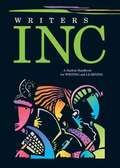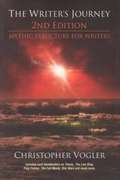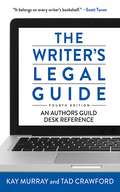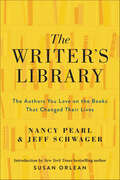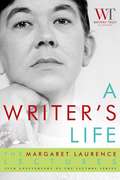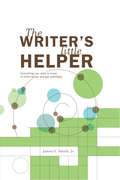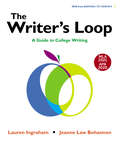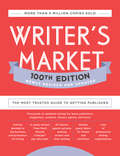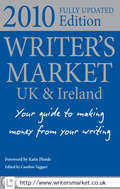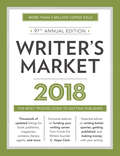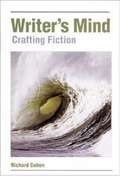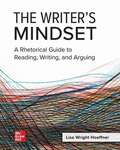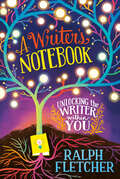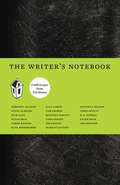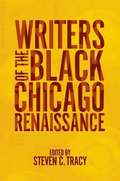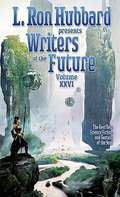- Table View
- List View
Writers Inc, A student Handbook for Writing and Learning
by Patrick Sebranek Dave Kemper Verne Meyer Chris KrenzkeNIMAC-sourced textbook
Writer’s Journal, Grade 5, Unit 4: Contemporary Fiction with excerpts from The House on Mango Street
by Core Knowledge FoundationNIMAC-sourced textbook
The Writer's Journey, Second Edition: Mythic Structure for Writers
by Christopher VoglerThe Writer's Journey sets forth archetypes common in what Vogler calls "the hero's journey," the mythic structure that he claims all stories follow. In the book's first section, he lists the different kinds of typological characters who appear in stories. In the second, he discusses the stages of the journey through which the hero generally passes. The final, supplementary portion of the book explains in detail how films like Titanic and The Full Monty follow the patterns he has outlined.
The Writer's Legal Guide, Fourth Edition: An Authors Guild Desk Reference
by Kay Murray Tad CrawfordIn an increasingly digitized and complex publishing world, writers need to know how to protect themselves against copyright infringement, legal trouble, and unwise concessions to publishers. Still the author's foremost advocate for copyright protection, fair contracts, and free expression, the Authors Guild has once again partnered with Allworth Press to update this invaluable reference. Thoroughly revised to reflect the many changes in the publishing industry, the fourth edition offers plain-English explanations of legal and business aspects of the trade, from electronic rights and ebooks to contracts and accounting. Other topics include: Registering copyrights, including onlineTaxes and bookkeepingFollowing fair use guidelinesNegotiating contracts with publishers and agentsObtaining permissions to use others' workDealing with periodical, syndication, film, television, play, and audio rights agreementsHandling business disputesUnderstanding libel, privacy, and the limits of free expressionAvoiding self-publishing misstepsPlanning authors' estates
The Writer's Library: The Authors You Love on the Books That Changed Their Lives
by Nancy Pearl Jeff SchwagerNEW & NOTEWORTHY ~ THE NEW YORK TIMES With a Foreword by Susan Orlean, twenty-three of today's living literary legends, including Donna Tartt, Viet Thanh Nguyen, Andrew Sean Greer, Laila Lalami, and Michael Chabon, reveal the books that made them think, brought them joy, and changed their lives in this intimate, moving, and insightful collection from "American's Librarian" and recipient of the National Book Foundation's Literarian Award for Outstanding Service Nancy Pearl and noted playwright Jeff Schwager that celebrates the power of literature and reading to connect us all.Before Jennifer Egan, Louise Erdrich, Luis Alberto Urrea, and Jonathan Lethem became revered authors, they were readers. In this ebullient book, America’s favorite librarian Nancy Pearl and noted-playwright Jeff Schwager interview a diverse range of America's most notable and influential writers about the books that shaped them and inspired them to leave their own literary mark. Illustrated with beautiful line drawings, The Writer’s Library is a revelatory exploration of the studies, libraries, and bookstores of today’s favorite authors—the creative artists whose imagination and sublime talent make America's literary scene the wonderful, dynamic world it is. A love letter to books and a celebration of wordsmiths, The Writer’s Library is a treasure for anyone who has been moved by the written word. The authors in The Writer’s Library are:Russell BanksTC BoyleMichael ChabonSusan ChoiJennifer EganDave EggersLouise ErdrichRichard FordLaurie FrankelAndrew Sean GreerJane HirshfieldSiri HustvedtCharles JohnsonLaila LalamiJonathan LethemDonna TarttMadeline MillerViet Thanh NguyenLuis Alberto UrreaVendela VidaAyelet WaldmanMaaza MengisteAmor Towles
A Writer's Life: The Margaret Laurence Lectures
by The Writers' Trust of CanadaFor anyone who loves great literature -- or aspires to write it -- this is an essential collection, full of insight, wisdom, humour, and candour from Canada's most important and beloved literary figures. For the past twenty-five years, the Writers' Trust of Canada's annual lecture series, the Margaret Laurence Memorial Lecture, has invited some of Canada's most prominent authors to discuss the theme of "A Writer's Life" in front of their peers. Hugh MacLennan, Mavis Gallant, Timothy Findley, W. O. Mitchell, Pierre Berton, P. K. Page, Dorothy Livesay, Alistair MacLeod, and Margaret Atwood, among others, have shared the personal challenges they faced in forging their own paths as writers, at a time when such a career was still unusual in this country. Intimate, frank, and revealing in tone, their lectures -- collected for the first time in celebration of the series' twenty-fifth anniversary -- provide a unique account of a period when a national writing community was just being formed, and give us unprecedented access to the heroes and heroines of Canadian literature as they share their insights into their work, the profession of writing, the growing canon of our literature, and the cultural history of our country.
The Writer's Little Helper: Everything You Need to Know to Write Better and Get Published
by James V. SmithBig Fiction Advice from a Little Book There is nothing little about the dynamic fiction-writing advice insideThe Writer's Little Helper. With big ideas, time-saving tips, and revision-made-easy charts, James V. Smith, Jr. offers effective guidance in short, easily checklists, Q&As, and practical tools. This book gives you everything you need to: Create great characters Maintain a compelling pace Craft believable dialogue Expand your creativity Revise your work to perfection Attract agent's and editor's attention And much, much more! The unique format of the book allows you to read from start to finish or to focus just on areas where your fiction needs work. With valuable and surprising tips on every page,The Writer's Little Helperis sure to become your biggest fiction writing aid.
The Writer's Loop with 2020 APA and 2021 MLA Updates
by Jeanne Bohannon Lauren IngrahamThis ebook has been updated to provide you with the latest guidance on documenting sources in MLA style and follows the guidelines set forth in the MLA Handbook, 9th edition (April 2021).The Writer’s Loop, presents a refreshing, practical approach to writing, based on the habits of strong writers, who pause often, reflect, and loop backwards and forwards as they revise on their way to a final draft. With integrated videos, relatable examples, clear explanations, and a consistent, scaffolded learning framework, each brief chapter engages writers through reflection and practices that support the most common types of academic writing, including essays, arguments, and research projectsAchieve with Ingraham and Bohannon, The Writer’s Loop combines instruction with integrated videos, powerful writing tools, and customizable multi-draft writing assignments.
Writer's Market 100th Edition: The Most Trusted Guide to Getting Published
by edited by Robert Lee BrewerThe most trusted guide to getting published, fully revised and updatedWant to get published and paid for your writing? Let Writer's Market, 100th edition guide you through the process. It's the ultimate reference with thousands of publishing opportunities for writers, listings for book publishers, consumer and trade magazines, contests and awards, and literary agents—as well as new playwriting and screenwriting sections, along with contact and submission information. Beyond the listings, you'll find articles devoted to the business and promotion of writing. Discover 20 literary agents actively seeking writers and their writing, how to develop an author brand, and overlooked funds for writers. This 100th edition also includes the ever-popular pay-rate chart and book publisher subject index.You'll gain access to: • Thousands of updated listings for book publishers, magazines, contests, and literary agents • Articles devoted to the business and promotion of writing • A newly revised "How Much Should I Charge?" pay rate chart • Sample query letters for fiction and nonfiction • Lists of professional writing organizations
Writer's Market 2010: Make Money Writing
by Caroline TaggartTHE MOST TRUSTED GUIDE TO GETTING PUBLISHED Written by writers for writers and backed by 89 years of authority, Writer's Market is the #1 resource for helping writers sell their work. Used by both seasoned professionals and writers new to the publishing world, Writer's Market has helped countless writers transform their love of writing from a hobby into a career. Nowhere else but in the 2010 Writer's Market will you find the most comprehensive and reliable information you need. This new edition includes: Complete, up-to-date contact information and submission guidelines for more than 3,500 market listings, including literary agents, book publishers, magazines, newspapers, production companies, theaters, greeting card companies, and more. Informative interviews, helpful tips and instructional articles on the business of writing. The "How Much Should I Charge?" pay rate charts for professional freelancers. Sample good and bad queries in the "Query Letter Clinic." Easy-to-use format and tabbed pages so you can quickly locate the information you need!
Writer's Market 2018: The Most Trusted Guide to Getting Published
by Robert Lee Brewer<p>Want to get published and paid for your writing? Let <i>Writer's Market 2018</i> guide you with thousands of publishing opportunities--including listings for book publishers, consumer and trade magazines, contests and awards, and literary agents. These listings feature contact and submission information so you can get started right away. <p>Beyond the listings, you'll find all-new material devoted to the business and promotion of writing. Discover the secrets to writing better queries and selling more articles, tips to earn money from blogging, and how to develop a standout author brand. Plus, you'll learn how to create an effective e-mail newsletter, improve organization, and build a solid foundation for long-term writing success. This edition includes the ever-popular pay-rate chart and book publisher subject index. <p>You'll also gain access to: <p> <li>Lists of professional writing organizations <li>Sample query letters</li> </p>
Writer's Mind: Crafting Fiction
by Richard CohenWriter's Mind: Crafting Fiction tells you in an entertaining yet authoritative manner all about the creative writing process: from imagining storylines to writing a first draft to publication.
The Writer's Mindset: A Rhetorical Guide to Reading, Writing, and Arguing
by Lisa HoeffnerTo become good writers, students must learn more than a writing process: they must develop a writer’s mindset―the rhetorical skills to read critically, analyze and synthesize sources, and write with their audiences in mind. How can we help students with the challenges involved in thinking like a writer? By using incremental steps that move from literal thinking to analytical and critical understanding, The Writer’s Mindset 1e makes the development of college-level writing capabilities possible for all students, whatever their level of preparedness. <p><p> The Writer’s Mindset provides students with tools to transform the way they approach reading, writing, and arguing through five key pillars: <p> <p>• Rhetorical Focus <p>• Incremental Approach <p>• Embedded Support <p>• Student Appeal <p>• Instructor Support <p><p> The breadth of coverage allows the text to be used in both semesters of Composition, including Composition sections tied to a Co-Requisite or ALP course, which makes this an excellent choice for 2-year schools. It also includes MLA 9e updates. Target opportunities using Everyone’s an Author, Everything’s an Argument, or Writing in the Works.
A Writer's Notebook: Unlocking the Writer Within You
by Ralph FletcherWriters are like other people, except for at least one important difference. Other people have daily thoughts and feelings, notice this sky or that smell, but they don't do much about it. Not writers. Writers react. And writers need a place to record those reactions. That's what a writer's notebook is for. It gives you a place to write down what makes you angry or sad or amazed, to write down what you noticed and don't want to forget . . . .
The Writer's Notebook II: Craft Essays from Tin House
by Christopher Beha Francine ProseThe Writer's Notebook II offers aspiring authors sixteen insightful essays about the craft of writing by Tin House authors and summer workshop faculty members, including Aimee Bender, Steve Almond, Maggie Nelson, Karen Russell, Benjamin Percy, and others. The Writer's Notebook II continues in the tradition of The Writer's Notebook, featuring essays based on craft seminars from the Tin House Summer Writer's Workshop, as well as a variety of craft essays from Tin House magazine contributors and Tin House Books authors. The collection includes essays that not only examine important craft aspects such as humor, suspense, and research but that also explore creating fractured and nonrealist narratives and the role of dream in fiction. An engaging and enlightening read, The Writer's Notebook II is both a toolkit and an inspiration for any writer. The Writer's Notebook II offers aspiring authors sixteen insightful essays about the craft of writing by Tin House authors and summer workshop faculty members, including Aimee Bender, Steve Almond, Maggie Nelson, Karen Russell, Benjamin Percy, and others.
The Writer's Notebook II
by Christopher Beha Francine ProseThe Writer's Notebook II continues in the tradition of The Writer's Notebook, featuring essays based on craft seminars from the Tin House Summer Writer's Workshop, as well as a variety of craft essays from Tin House magazine contributors and Tin House Books authors. The collection includes essays that not only examine important craft aspects such as humor, suspense, and research but that also explore creating fractured and nonrealist narratives and the role of dream in fiction. An engaging and enlightening read, The Writer's Notebook II is both a toolkit and an inspiration for any writer.
The Writer's Notebook II: Craft Essays from Tin House
by Francine Prose Christopher BehaThe Writer's Notebook II offers aspiring authors sixteen insightful essays about the craft of writing by Tin House authors and summer workshop faculty members, including Aimee Bender, Steve Almond, Maggie Nelson, Karen Russell, Benjamin Percy, and others. The Writer's Notebook II continues in the tradition of The Writer's Notebook, featuring essays based on craft seminars from the Tin House Summer Writer's Workshop, as well as a variety of craft essays from Tin House magazine contributors and Tin House Books authors. The collection includes essays that not only examine important craft aspects such as humor, suspense, and research but that also explore creating fractured and nonrealist narratives and the role of dream in fiction. An engaging and enlightening read, The Writer's Notebook II is both a toolkit and an inspiration for any writer. The Writer's Notebook II offers aspiring authors sixteen insightful essays about the craft of writing by Tin House authors and summer workshop faculty members, including Aimee Bender, Steve Almond, Maggie Nelson, Karen Russell, Benjamin Percy, and others.
The Writer's Notebook II: Craft Essays from Tin House
by Francine Prose Christopher BehaThe Writer's Notebook II offers aspiring authors sixteen insightful essays about the craft of writing by Tin House authors and summer workshop faculty members, including Aimee Bender, Steve Almond, Maggie Nelson, Karen Russell, Benjamin Percy, and others. The Writer's Notebook II continues in the tradition of The Writer's Notebook, featuring essays based on craft seminars from the Tin House Summer Writer's Workshop, as well as a variety of craft essays from Tin House magazine contributors and Tin House Books authors. The collection includes essays that not only examine important craft aspects such as humor, suspense, and research but that also explore creating fractured and nonrealist narratives and the role of dream in fiction. An engaging and enlightening read, The Writer's Notebook II is both a toolkit and an inspiration for any writer. The Writer's Notebook II offers aspiring authors sixteen insightful essays about the craft of writing by Tin House authors and summer workshop faculty members, including Aimee Bender, Steve Almond, Maggie Nelson, Karen Russell, Benjamin Percy, and others.
Writers of the Black Chicago Renaissance
by Steven C. TracyWriters of the Black Chicago Renaissance comprehensively explores the contours and content of the Black Chicago Renaissance, a creative movement that emerged from the crucible of rigid segregation in Chicago's "Black Belt" from the 1930s through the 1960s. Heavily influenced by the Harlem Renaissance and the Chicago Renaissance of white writers, its participants were invested in political activism and social change as much as literature, art, and aesthetics. The revolutionary writing of this era produced some of the first great accolades for African American literature and set up much of the important writing that came to fruition in the Black Arts Movement. The volume covers a vast collection of subjects, including many important writers such as Richard Wright, Gwendolyn Brooks, and Lorraine Hansberry as well as cultural products such as black newspapers, music, and theater. The book includes individual entries by experts on each subject; a discography and filmography that highlight important writers, musicians, films, and cultural presentations; and an introduction that relates the Harlem Renaissance, the white Chicago Renaissance, the black Chicago Renaissance, and the Black Arts Movement. Contributors are Robert Butler, Robert H. Cataliotti, Maryemma Graham, James C. Hall, James L. Hill, Michael Hill, Lovalerie King, Lawrence Jackson, Angelene Jamison-Hall, Keith Leonard, Lisbeth Lipari, Bill V. Mullen, Patrick Naick, William R. Nash, Charlene Regester, Kimberly Ruffin, Elizabeth Schultz, Joyce Hope Scott, James Smethurst, Kimberly M. Stanley, Kathryn Waddell Takara, Steven C. Tracy, Zoe Trodd, Alan Wald, Jamal Eric Watson, Donyel Hobbs Williams, Stephen Caldwell Wright, and Richard Yarborough.
Writers of the Future, Vol 26
by L. Ron Hubbard K. D. WentworthDiscover Imaginative New Worlds of Tomorrow. Discover the new visionaries of imagination in the Writers of the Future. Established in 1983 by L. Ron Hubbard expressly for the aspiring writer, Writers of the Future has become the most respected and significant forum for new talent in all aspects of speculative fiction. Never before published first-rate science fiction and fantasy stories selected by top names in the field. "Not only is the writing excellent...it is also extremely varied. There's a lot of hot new talent in it." --Locus Magazine
